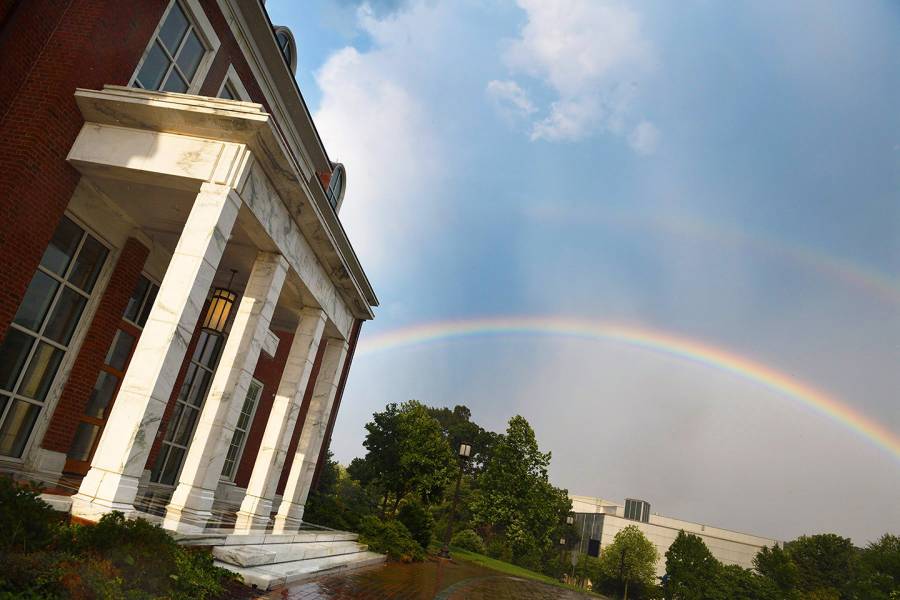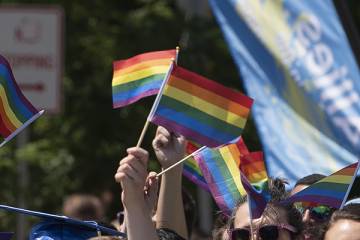As colleges and universities nationwide closed their campuses this spring in response to the ongoing coronavirus pandemic, a profound sense of loss among students soon followed. But for some LGBTQ students, the absence of campus life has also meant separation from a place where they can openly—and safely—express themselves. An unfortunate result of physical distancing requirements and stay-at-home orders is the possibility that queer-identifying students may be forced to quarantine with parents or other family members who do not support their identities.
"The disruption to the academic year also meant a disconnection from the typical sources of support for students," says Demere Woolway, director of LGBTQ Life at Johns Hopkins University. "Some queer students have returned to families of origin who may not be supportive of their identities. Others have remained in Baltimore but are unable to access their communities as they have in the past."
The office has been working to ramp up remote services for Blue Jays who are in need of extra support and to create multiple avenues for all members of Hopkins' queer community to connect with each other throughout the summer and fall. The office serves all nine academic divisions of Johns Hopkins.
Every Monday and Wednesday, Woolway hosts open office hours on Google Hangouts. "People can send individual requests or join the bigger group if they want to," she says. Conversations are left open-ended, allowing peer groups to catch up with each other and helping new or prospective students find information about LGBTQ Life's programs and events.
Woolway was intentional about choosing Google Hangouts as the virtual office space: The software not only allows students to make the first connection but also gives them the option of communicating through text-based chat or by emailing questions rather than requiring voice or video. These are important considerations for students who may be anxious about being overheard by family members.
"Advising students in unsafe spaces depends on the individual situation," Woolway says. "That's why we're trying to be available through many formats."
When a student does reach out from an adverse home environment, the first step is to work with them to determine what, if any, spaces of safety are still available to them. These safe spaces can take many forms and may include seeking out supportive individuals such as family members or neighbors or getting some physical or mental distance from their surroundings by spending time alone walking the dog or reading a book.
Woolway also emphasizes the importance of keeping in contact with trusted friends, faculty, and staff members from Hopkins. Even though physical distance is a must, social and emotional connections are still available. And many of Hopkins' student services offices are still open and operating remotely through the shutdown.
"It's harder to build new connections in a digital format," Woolway says. "I think that's what's lost not being in person." To counteract this loss of connection, LGBTQ Life has also been conducting monthly socials, which not only give established friends and colleagues a chance to reunite but also provide an open and accepting space to meet new people. Participants convene over Zoom and then have the option to split into smaller groups to chat on specific topics that are voted on prior to the event.
"Our April social had a good turnout and interesting conversation," Woolway says. But she also acknowledges the limitations of virtual meetups. "People get fatigued with Zoom and other digital connections, especially if they're also taking classes or having meetings that way. The important thing is to hold a space for people to engage. Whether six people come or 30 people come, as long as they connect, that's great."
LGBTQ Life also took its annual Lavender Celebration online earlier this month, spotlighting the accomplishments of this year's LGBTQ graduates. The graduates were invited to select someone special to them to film a short message introducing the graduate to the community. The videos were then collected and shown as part of a Zoom watch party on May 3.
With June—Pride Month—just around the corner, LGBTQ Life plans to host a special, Pride-themed social as well as "What Are We Proud Of?", an interactive presentation and discussion about the history of Pride, which takes place on June 25. "The event is near the Stonewall anniversary," Woolway says. "We'll be talking about why we celebrate in June, what we're proud of in this current moment, and what we want to leave as our legacy."
For the full roster of upcoming LGBTQ Life events, check out the special summer 2020 webpage. All Hopkins students, staff, faculty, and alumni are welcome to join in.
LGBTQ Life's office hours are Mondays from 1:30 p.m. to 4:30 p.m. EDT and Wednesdays from 10 a.m. to noon EDT. To join, contact lgbtqlifeoffice@gmail.com on Google Hangouts. Additional mental health resources and COVID-19-related wellness resources are available to the Johns Hopkins community.
Posted in Student Life
Tagged lgbtq life









